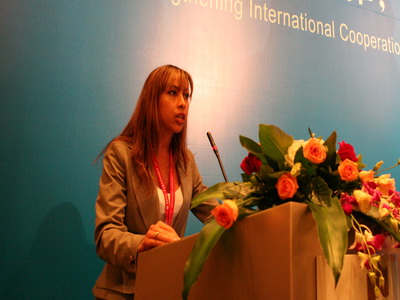
Good morning Ladies and Gentlemen,
I am going to share with you things that are not politically correct in Europe.
When it comes to energy and environment, the current economic crisis brought with it a major short term conflict. That conflict is between the immediate need for economic growth and prosperity which requires more and cheaper energy, and the longer term desire to reduce carbon emissions.
Key priorities:
Prior to the current economic crisis, one can say that climate change became a new religion in Europe. What was most alarming was to witness politicians from all political persuasions engaged in an increasingly absurd auction of totally unrealistic, uncosted, carbon emission reduction targets for 2050. But the economic crisis came as a wake-up call in some quarters, as funds and capital dried out and Government budgets squeezed. Still, we hear some bold statements made by some political figures claiming that they are more dedicated than ever to meeting their ambitious carbon emissions targets. In the UK, for instance, Mr. Miliband, the minister for energy and climate, recently stated that “Everything must change and yet nothing must change”. What the minister meant is that the UK will still be able to reduce its carbon emissions by 80% by 2050 without any change to our lifestyles.
But Ladies and Gentlemen, a degree of realism is urgently needed.
If we consider the three current issues: economic recovery, energy security and climate change, there is little disagreement about which one should be the priority. Economic recovery and energy security are bound to come first, while climate change second. Why? Simply because we are looking at different time frames: economic recovery and energy security needs are here and now whereas climate change is a long term issue.
Change is happening
We all know that the world after the economic crisis is not going to be the same. We need to deal with Governments in debt, with change in global powers, with more regulation and intervention, and stronger competition for resources – not because we are not running out of resources but mainly because oil and gas reserves are located in areas that are restricted or closed to foreign investment.
The energy challenge
We also recognise that to tackle climate change, we need to curb demand for fossil fuels, hence prices must increase and carbon taxed. But if energy becomes more expensive the economic recovery will be delayed.
We constantly hear about the need to develop alternative sources of energy to reduce our CO2 emissions, but we all know that the contribution of renewable energy sources to the global energy mix is still modest and unlikely to significantly change in the next 2/3 decades.
We also hear about the myth of energy independence. But where did the principles of international trade disappear?
Is there a way out of this labyrinth?
It will not be easy, as compromise must be made. But there is a need for brave stances and very hard realistic thinking to manage our way out of those transition problems.
There are many needs and few resources to tackle them all. So let’s devote our joint efforts to tackle the immediate need first.
Today the focus must be on economic recovery. But we must be careful about subsidising energy or making it deliberately expensive through taxes. Energy efficiency can provide a more effective and faster solution than alternative sources of energy.
Green technology should be made commercial. But the PUBLIC SECTOR must work together with private enterprise and consumer needs.
We also have to recognise that fossil fuels have been dominant for more than 150 years and will remain so for many years to come.
And we must not forget about energy security, and the need for affordable, reliable, and sustainable energy supply.
Most importantly, we should think seriously about what may sound politically incorrect, and what is in my judgement the mother of all problems: population growth. 2-3 billion people will be added to the world population by 2050, and 80% of that growth will come from the developing countries.
Ladies and Gentlemen, I believe you have set yourself very high aspirations. I am sure that potential difficulties are gully recognised. The West is looking forward to modern China, meeting these challenges.